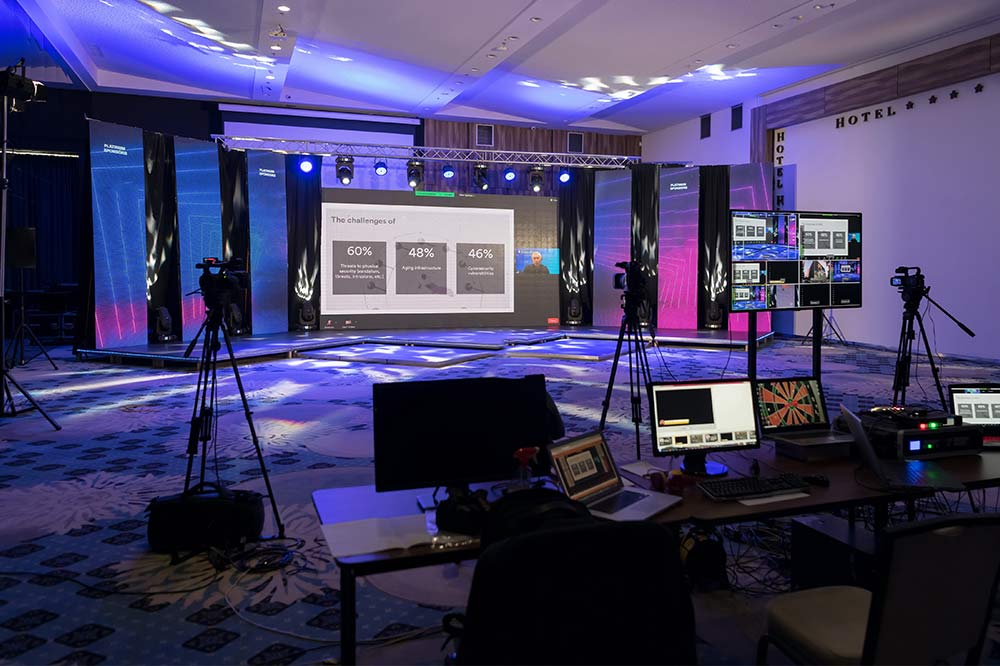One of the biggest benefits of running virtual events and webinars, beyond their scalability and cost-saving benefits, is that they're easy and reliable to run. All you need is a trusted online events platform, some editing software, a microphone, webcam, and an internet connection.
That's still true despite COVID-19 turning the world as we know it upside down, but as is the case for most industries, coronavirus has thrown a few extra challenges our way that must be considered and overcome to run a successful online event right now.
Here are the three biggest challenges our team has noticed in recent weeks and a few ways that you can safeguard against them to ensure your upcoming event is a success.
Challenge #1: Slower Internet Speeds
On March 25, which already feels like a lifetime ago, Forbes published an article stating that internet usage was up by 70%. It has also been widely noted that global broadband and mobile speeds have decreased as of April 2020.
Slower internet speeds increase the risk of encountering technical issues or lags in your content when recording or presenting an online event. While there is little anyone can do to improve global internet speeds, there are a few way you can mitigate the risk of this impacting your event.
⟶ How to Host a Webinar From Home: Everything You Need to Know. Read more.
Look for Cloud-Based Webinar and Virtual Events Platforms
If you are still in the process of finding the right webinar provider for your events, look for platforms that are entirely cloud-based. Cloud-based platforms offer many advantages - from enhanced security to scalability and even greater management of compliance. The most important advantage right now is their ability to condense content from multiple presenters into a single stream. This creates a more reliable platform experience and makes it easier and faster for your audience to load and watch your content without lags or technical issues.
Test and Boost Your Internet Connections
Each of your presenters must test their internet connection before attempting to record or present your event. It's best to test the connection multiple times throughout the day to confirm that their home connection will be strong enough to power their presentation.
Whenever possible, have your presenters use a dedicated broadband connection to produce the highest quality content. If that isn't an option, look to get a WiFi booster for each presenter to help minimize the risk of losing their connection mid-presentation.
Simplify Your Presentation Format
While we can't control internet speeds, we can control the format of our online event. The more complicated and layered our events are, the more bandwidth they require and the more susceptible they are to internet related issues.
While this is not ideal, we recommend considering the following for your upcoming events during COVID-19:
- Switch from running live webinars to using simulive webinars
- Limit your use of webcams - only use webcams when they add significant value to your event
- Try to avoid running your event at peak internet usage hours - if schools are still closed in your country you may want to try running your event outside of school hours when students are offline
Challenge #2: Increased Demand
The demand for online meeting tools, webinar and virtual events platforms has rapidly increased beyond what anybody could have forecasted prior to COVID-19. What this means for companies that provide the software needed to run your events, is they've needed to quickly and efficiently scale their server capacity to meet the increased demand.
By now I'd expect that all online event companies have successfully scaled their server capacity, but as with anything in life, the more people that are using a product, the more likely you are to encounter unexpected issues.
The Late Event Effect
We all know that people are impatient. If an online event is even a few seconds late to start, people (myself included) will start refreshing their screen trying to get the video to play. While this is normal human behavior that should be expected, it can put unexpected strain on the servers used to run your event. If a late event was large enough, it could negatively impact the performance of all events running at that time, or even crash the server.
At WorkCast, we account for this type of behavior and have scaled our server capacity accordingly. But in the spirit of everyone working together to get through this difficult period of time, here are a few ways you can help mitigate the risk of your event starting late or your audience getting impatient and refreshing their screens:
- Automate your event to start on time (a few seconds early is better than a few seconds late)
- Use splash images and copy within the event auditorium to let people know they're in the right place and your event will start automatically at a set time
- Include links to additional content in your resource section for people to browse while they wait for your event to start
- Build interactive features into your event auditorium that people can play with while they wait for your event to start. (i.e. A college or university could embed an interactive Google Map of their campus for people to explore during their open house webinar)
Challenge #3: People are Working From Home
While this challenge is far less technical than the last two, it is equally important to consider. Having a large portion of your audience working from home will make it more difficult to get peoples' undivided attention. Tailoring your event format to accommodate people working from home will help ensure your event is successful despite having a distracted audience.
Make it as easy as possible for people to consume your content by exploring options like:
- Creating a channel for your webinar content where people can log in and watch a small series of videos rather than one large presentation
- Make your content available on-demand after it airs so that people can go back and re-watch any parts they missed
- Offer multiple sessions for a single webinar so that people can easily work it into their schedule
- Provide transcripts, blogs, or copies of your slide in the resource section of your webinar so people can skim the content
- Create kid-friendly content that parents can download for their kids to color or learn from while they watch your webinar
Making these small changes and accommodations for people who are working from home will go a long way in building relationships with your audience.
During COVID-19 the challenges we face as a global community will shift and evolve over time. Our team at WorkCast will continue to update you on the changes and challenges facing the world of online events, and provide you with our best advice to overcome them.
Share this
You May Also Like
These Related Stories

Using Webinars and Podcasts to Elevate Your Brand: Key Benefits, Unique Strengths, and Challenges

How To Nurture Your Online Community in 4 Ways


